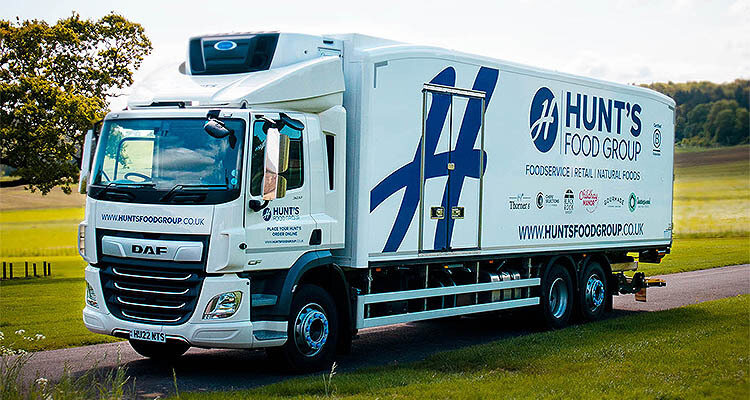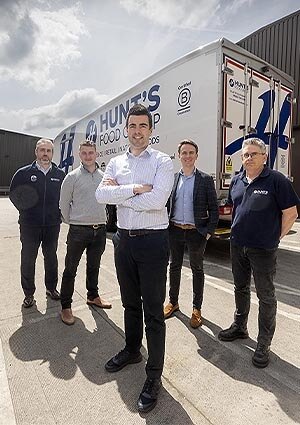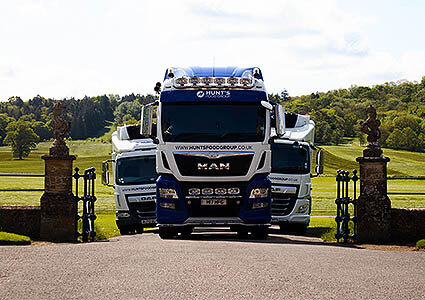
How Hunt’s Food Group embodies its values of being a sustainable business, committed to social good
Hunt’s Food Group (Hunt’s) manufactures, sells and delivers great-tasting food that’s loved by everyone. From supporting the local community to cleaner and greener ways of operating, Hunt’s strives to make business operations sustainable for generations to come. Thomas Hunt, Managing Director, shares that team success, quality products and the environment are key to the business’ continued prosperity.

Meet the member profile at Hunt’s Food Group
©Roy Kilcullen/RKP.uk.com
“We started as tenant farmers at Blackmarsh Farm, which is part of the Sherborne Castle Estate and today is farmed by my cousin Charlie,” he begins. “We bottled milk and sold it locally, which is how the business began, back in 1912. Over the years that grew to the point where we had our own bottling factory and 11 dairies across the Southwest of England.
“The real driving force behind our growth was Michael Hunt, who was the third generation of the Hunt family to be involved in the business. In 1976, Michael anticipated that supermarkets would start selling their own milk and decided that selling the dairy business would be the best course of action. The money made was reinvested in the construction of one of the biggest cold stores in Europe at that time, which is now our head office, Ludbourne Road in Sherborne.
“We initially stored products for supermarkets, but by the early 80s, supermarkets were starting to build their own facilities, and this segment began to dry up. As such, we started selling retail frozen food and ice cream to customers around the South of England. The business then branched out into other frozen items as well as chilled and ambient products. In 2004, my dad, Richard Hunt, took over as managing director and since then, the business has continued to grow. We established a butchery division and completed several acquisitions. We acquired Queenswood Natural Foods, among others, which has enabled us to move into the health food market.
“More recently, we took on a site in Nottingham and have started distributing in that part of the UK. The business has grown organically, and we’ve focused on acquiring smaller family run businesses with the same ethos as us. Another significant acquisition was Thorner’s, a local butchery and kitchen business based in Somerset that champions local ingredients to make the best quality products. From ice cream to Cornish pasties, we have a broad range of award-winning own brands that are exclusive to Hunts,” Thomas explains.
“The business is in a good place. We’re still family owned and run and continually reinvest in the company. We give £150,000 to charity every year. While we sometimes pay a dividend, that is capped at £150,000. When you’re not taking money out, there’s capital to invest in buildings, infrastructure, systems, and acquisitions. We employ lots of different people, some of whom have been in the business for 25 years or more and we ensure our team-first philosophy is prioritized. We don’t micromanage people but rather enable our management team to do what they feel best. We listen to our team, which I feel is crucial.
 Team-first approach
Team-first approach
“Everyone within our management team has progressed from colleague level. I started working in the warehouse when I was 16 and have worked in the telesales, butchery and transport departments; being hands-on helps understand the job. We’re not a wildly formal company, but instead promote an open-door culture. We host several team events from HUNTS FEST, our annual festival, to five-a-side football and an open farm Saturday each year. Being a certified B-Corporation demonstrates our team-first approach. We’re a living wage and living hours employer, all sites are BRC accredited to A-Grade or above and we invest in our employees’ safety, holding ISO 45-001 accreditation. Hunt’s conducts regular team surveys, consults its employee representative body on aspects such as charitable giving and prides itself on knowing each and every employee.
“The business takes environmental sustainability seriously as is demonstrated in our 2023 annual accounts which show a 67 percent reduction in carbon emissions from the 2020 accounts despite a 27 percent growth in sales in this period. It is a big commitment but something our team are hugely passionate about. We installed solar panels on all our main buildings, reduced carbon emissions by 90 percent from using biodiesel in trucks, ensured all company cars were electric or hybrid, reduced food wastage through donating to the Devon & Cornwall Food Action Group, planted trees, hedges and wildflowers on the companies’ farms and increased the volume of product recycled.”
Greener and cleaner
Over the years, the business has experienced considerable change, with technology having a sizeable operational impact. “In our warehouse, we now employ voice-directed picking technologies. Additionally, our vehicles use telematics for more fuel efficient and safer driving. Fifty percent of our customer base order online and the amount of data analysis that supports decision making is huge and very different from how we used to operate ten years ago.”
Looking to the future, Thomas shares his hopes for 2024. “We will continue to increase our service levels and improve order fulfilment processes. We’re looking at different technologies to enhance our online ordering platforms. We’re also expanding our ranges and moving into product sectors that we haven’t traditionally dealt with, such as fruit and vegetables and alcohol.
“Looking further ahead, while increasing our turnover and profitability is important, I’d like the business to keep embodying our values of being trustworthy and dependable, selfless and adaptable, relentlessly determined and possessing the personal touch. We will continue to be a people-centric business and a place where people want to work. I’d also like to think that alongside our continued work with charities and the community, we’ll continue to be a greener and cleaner business,” he concludes.